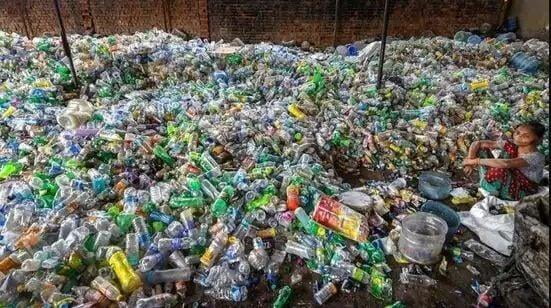India will completely ban some single-use plastic products from July 1 this year, the Central Pollution Control Board said. The pollution regulator has issued notices to manufacturers, retailers and e-commerce sites to ensure that these items are no longer used or sold.
"We have issued instructions to the State Pollution Control Board, almost all e-commerce websites, sellers and users of single-use plastics, Indirect Taxes and the Central Board of Customs stating that no single-use plastics, should be sold, stored or used in the notification dated August 12, 2021," a board official, who did not want to be named said. "Several meetings and discussions have been held on the implementation of the ban, so we expect all stakeholders to comply."
Prohibited plastic items include ear plugs, flags, candy and ice cream bars, decorative hot glue, PVC banners less than 100 microns thick, stirrers, packaging film, cups, glasses and cutlery.

In addition, from December 31, no plastic carrier bags with a thickness of less than 120 microns may be used.
According to a fact sheet issued by the Ministry of Environment and the think tank Energy and Resources Institute (TERFI), about 43 percent of plastic is used for packaging, most of which is single-use. India's per capita plastic use is about 9.7 kilograms, mainly for packaging materials, the central pollution agency estimates. Without improvements in consumption patterns and waste management practices, there will be approximately 12 million tons of plastic waste in landfills and in the environment by 2050. Single-use plastics contaminate soil and water, clog waterways and exacerbate natural disasters. Plastics clog sewage systems, provide breeding grounds for mosquitoes, and release toxic chemicals and emissions when burned.
Last July 29, federal pollution watchdogs directed all state pollution control boards to conduct quarterly assessments of single-use plastic phase-out in their jurisdictions, as well as detailed information on production capacity and alternatives.
But the information submitted by the states was incomplete, according to the latest directive issued earlier this month. The board met with state counterparts on Jan. 21 to assess the situation and then developed an action plan to phase out certain plastic items.
It has instructed the state board to revoke or modify permits and registrations issued to single-use plastic manufacturers to ensure they achieve zero inventory by July 1. And the National Pollution Board must also instruct raw material manufacturers and e-commerce companies to stop supplying and stop selling the banned items.
They must also issue public notices within their jurisdictions and issue new commercial licenses to major retailers, retailers, sellers, and commercial establishments so they do not stockpile or use prohibited items. States are also required to develop local bylaws to levy compensation in accordance with central guidelines if the ban is violated.
On Feb. 4, the central pollution control department issued a notice informing some single-use plastic product manufacturers, distributors, retailers, e-commerce companies and shopping malls to ensure zero inventory of prohibited products by June 30.

